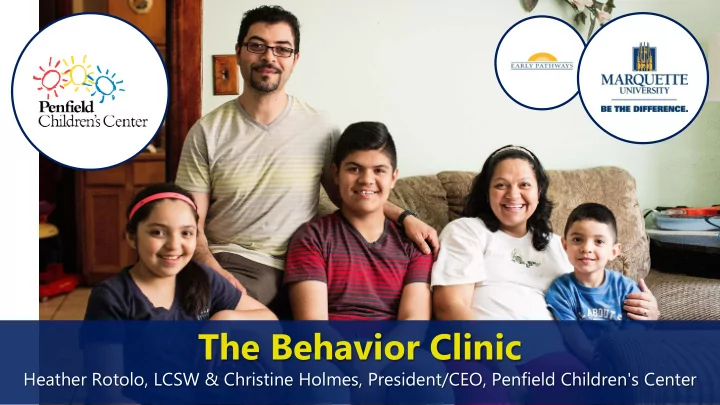

The Behavior Clinic Heather Rotolo, LCSW & Christine Holmes, President/CEO, Penfield Children's Center
Important Dates 1986 2003 2015 2010 The Behavior Dr. Robert Fox Penfield The Behavior Clinic receives establishes The Children’s Center Clinic receives national state certification Parenting Center and Marquette accreditation from at Marquette University create as “Outpatient Substance Abuse Mental Health University & STAR the Behavior and Mental Parenting Clinic Clinic” Health Services program Administration (SAMHSA)
Important Dates Today Penfield Children’s Center Clinical director • Family counselors • Bilingual family counselors • School counselor 2016 2017 • Counseling interns • Penfield Montessori Academy In-school counselor • Counseling interns Receives 5-year Create school-based • federal grant from mental health clinic Marquette University SAMHSA at Penfield Clinical psychologist-clinic consultant Montessori Academy • Doctoral students • Research assistants •
Our Strategic Priorities 1. Provide behavioral health services 2. Train graduate and doctoral students 3. Publish and present research findings
Priority #1: Clinical Services We serve more than 400 children each year and provide: Home-based behavioral therapy • Focus on the parent-child relationship • Hands-on teaching model • Advocacy services to help meet basic needs • Safety supplies and toys to support child’s development •
Priority #2: Training Graduate and doctoral students: Fulfill supervised clinical hour requirements • Train in the Early Pathways program • Gain pediatric mental health field work experience •
Early Pathways Program This is an evidence-based program for resolving behavior problems in children five years of age and younger, particularly for families living in poverty. Five components to the program include: 1 2 3 4 5 Parent-child Appropriate Cognitive Differential Limit-setting relationship expectations Strategies attention and strategies positive reinforcement
Early Pathways Success Story Donny, a 1-year-old foster child with multiple developmental delays, was referred to the Early Pathways program by his pediatrician due to concerns regarding attachment, separation anxiety and past trauma. 11 treatment sessions took place that helped Donny: Strengthen his attachment to his foster mother (eye contact, seeking her out for comfort, smiling) • Re-regulate within 1-2 hours following visitation with his biological mother, rather than 2-3 days • Make consistent gains with his Birth-to-Three team • Heal from past trauma through nurturing activities and self-directed play therapy •
Early Pathways Achievements Early Pathways is effective in: Reducing disruptive behavior disorders • Improving the family-child relationship • Improving child functioning and well-being • Treating mental health disorders • Teaching positive parenting behaviors • Reaching a diverse population of children in their homes • Increasing community capacity •
Priority #3: Research and Publications 29 publications 45 presentations 10 dissertations
11% F Earned revenue 7% (Medicaid and United Way insurance) U N D 18% Foundations and individuals I 64% Government grants- SAMHSA N (5 years, $1.9 million) G
Your Support With your continued support, the Behavior Clinic can continue to: Provide treatment to infants, Treat children who have Provide advocacy to meet toddlers and young children experienced trauma at a the immediate needs of our where they are most young age in order to set families comfortable – in their own them on a path for success homes later in life
We Need Your Help Young children, especially those who have experienced trauma, should not be denied healing services because their parents cannot afford treatment. Medicaid only covers 10-15% of behavioral therapy services for children. We need to strengthen policies that support prevention services for young children and fund programs, like the Behavior Clinic that allow our next generation of mental health professionals to receive high-quality, trauma-informed education and training.
Recommend
More recommend